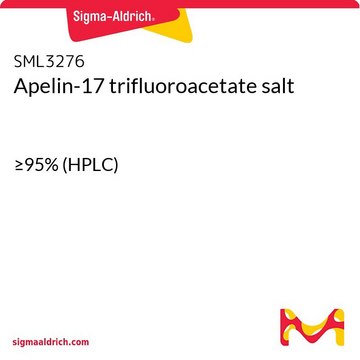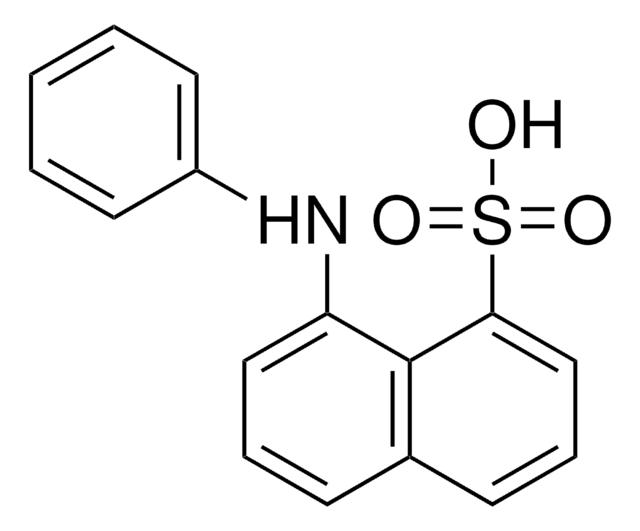A6469
Apelin-13 trifluoroacetate salt
≥95%
Synonym(s):
Prepro-65-77-Apelin
About This Item
Recommended Products
Quality Level
Assay
≥95%
form
powder
UniProt accession no.
storage temp.
−20°C
SMILES string
OC(=O)C(F)(F)F.CSCC[C@H](NC(=O)[C@@H]1CCCN1C(=O)CNC(=O)[C@H](CCCCN)NC(=O)[C@H](Cc2cnc[nH]2)NC(=O)[C@H](CO)NC(=O)[C@H](CC(C)C)NC(=O)[C@H](CCCNC(N)=N)NC(=O)[C@@H]3CCCN3C(=O)[C@H](CCCNC(N)=N)NC(=O)[C@@H](N)CCC(N)=O)C(=O)N4CCC[C@H]4C(=O)N[C@@H](Cc5ccccc5)C(O)=O
InChI
1S/C69H111N23O16S.C2HF3O2/c1-39(2)32-47(86-58(98)44(17-9-26-78-68(73)74)83-63(103)52-20-12-29-91(52)65(105)45(18-10-27-79-69(75)76)84-56(96)42(71)22-23-54(72)94)59(99)89-50(37-93)61(101)87-48(34-41-35-77-38-81-41)60(100)82-43(16-7-8-25-70)57(97)80-36-55(95)90-28-11-19-51(90)62(102)85-46(24-31-109-3)66(106)92-30-13-21-53(92)64(104)88-49(67(107)108)33-40-14-5-4-6-15-40;3-2(4,5)1(6)7/h4-6,14-15,35,38-39,42-53,93H,7-13,16-34,36-37,70-71H2,1-3H3,(H2,72,94)(H,77,81)(H,80,97)(H,82,100)(H,83,103)(H,84,96)(H,85,102)(H,86,98)(H,87,101)(H,88,104)(H,89,99)(H,107,108)(H4,73,74,78)(H4,75,76,79);(H,6,7)/t42-,43-,44-,45-,46-,47-,48-,49-,50-,51-,52-,53-;/m0./s1
InChI key
IUOVYCLNUOUEHV-PDGAQFIRSA-N
Gene Information
human ... APLN(8862)
Amino Acid Sequence
General description
Application
Biochem/physiol Actions
Other Notes
Storage Class Code
11 - Combustible Solids
WGK
WGK 3
Flash Point(F)
Not applicable
Flash Point(C)
Not applicable
Personal Protective Equipment
Choose from one of the most recent versions:
Already Own This Product?
Find documentation for the products that you have recently purchased in the Document Library.
Customers Also Viewed
Our team of scientists has experience in all areas of research including Life Science, Material Science, Chemical Synthesis, Chromatography, Analytical and many others.
Contact Technical Service







